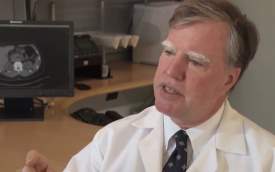
Giles Whalen, MD, professor of surgical oncology and principal investigator on early clinical trials to develop the Alphaject technology developed by Uri Galili, PhD, professor of surgery and medicine.
UMass Medical School has licensed “anti-gal” technology developed by Uri Galili, PhD, professor of surgery and medicine, to newly formed biopharmaceutical company Agalimmune Ltd. for the purpose of developing innovative immunotherapies for the treatment of solid tumor cancers. Agalimmune is supported by an investment group comprising Loxbridge Research LLP and Animatrix Capital LLP and is based in London and California. Initial funding raised by the company will be used to continue the translation of the UMMS anti-gal technology, AlphajectTM, to the clinic.
Alphaject is based on more than 20 years of biomedical research carried out by Dr. Galili, who discovered the anti-gal immune response and its role in organ transplant rejection. Using the same anti-gal immune response, Alphaject can treat solid tumors in such a way that the body actively rejects them, akin to a non-matched graft or transplant.
“Immunotherapy holds great promise as a potential cancer treatment because it allows the body’s own immune system to identify and eradicate cancer cells,” said Giles Whalen, MD, professor of surgical oncology and principal investigator on early clinical trials to develop the Alphaject technology. “One of the great benefits of this approach is that the immune system can seek out and attack even the smallest traces of tumor anywhere in the body.”
Injected directly into solid tumors, the Alphaject compound coats the cancer cells in alpha-gal, to which humans naturally have a high antibody concentration. The alpha-gal antigen is then recognized by the immune system as foreign, allowing it to begin destroying the cancerous cells immediately. Because the immune system now identifies the cancer cells as foreign, going forward it is able to recognize and remove any stray cancer cells that might be left after conventional surgery or that may have migrated away from the main tumor. The effect is analogous to a personalized cancer vaccine, acting continuously to prevent both metastasis and recurrence.
“What makes Alphajectso remarkable is it’s designed to alert the immune system and respond to a specific type of cancer cell,” said Dr. Whalen. “Unlike other immunomodulatory therapies, which may stimulate the immune system to attack cells indiscriminately, this helps ensure healthy cells don’t get mistakenly targeted and destroyed.”
“The development of immunomodulatory therapies is an exciting and rapidly emerging field, which hopefully will lead to improved anti-cancer treatments for patients,” said Mike Westby, CEO of Agalimmune.
Charles Roberts, MD, CEO of Loxbridge Research, said, “Agalimmune is the first therapeutic investment we have made at a stage when the technology has already been in patients, and we are honoured to be working with proven innovators UMass Medical School and Dr Galili, in furthering this promising treatment toward the eventual benefit of people battling cancer.”